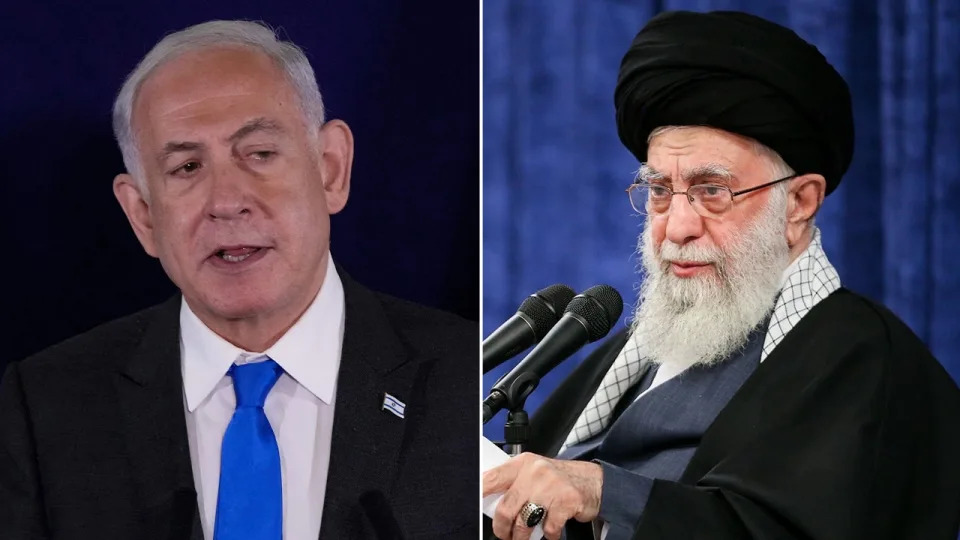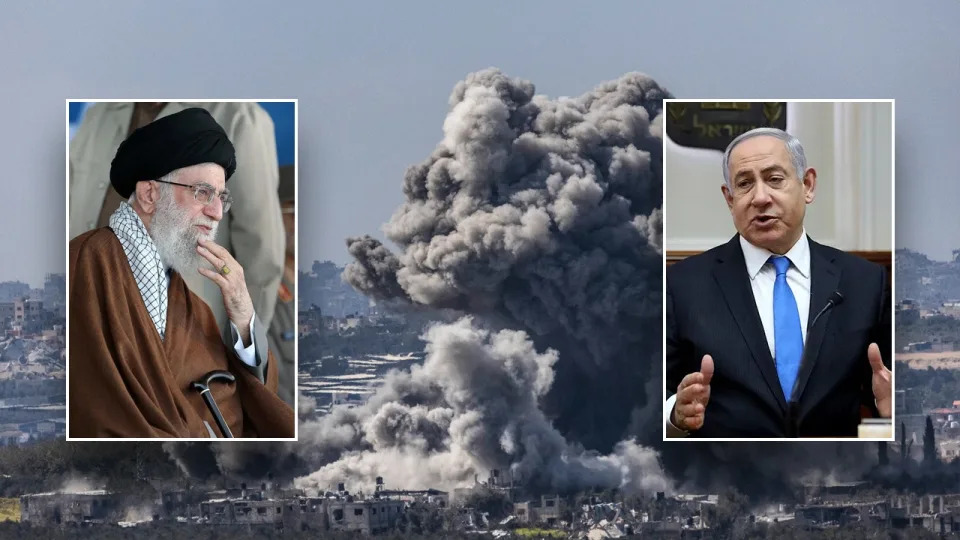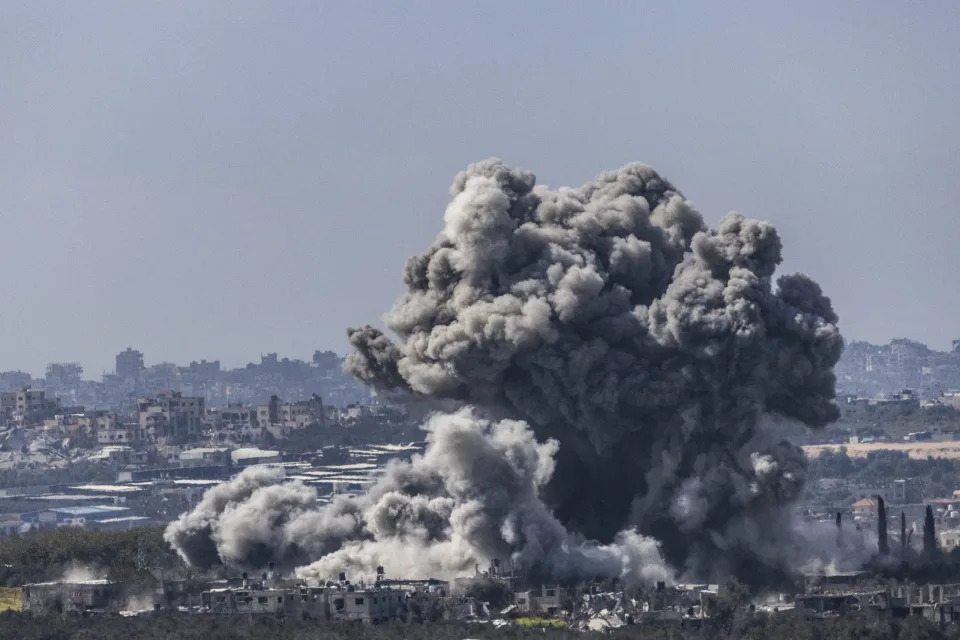American forces have intercepted Iranian drones targeting Israel, according to a U.S. defense official.
The official said the U.S. continues to “shoot down Iranian-launched drones targeting Israel.”
“Our forces remain postured to provide additional defensive support and to protect U.S. forces operating in the region,” the official added.
Iran has launched a wave of drones and missiles at Israel in retaliation for an alleged Israeli strike on the Iranian embassy in Damascus, Syria, earlier this month.
The Damascus strike killed two senior Iranian officers, dealing a major blow to Tehran.
The British Royal Air Force have also deployed to the Middle East and are prepared to intercept any Iranian drones headed to Israel, said the U.K.’s Secretary of State for Defense Grant Shapps.
“I strongly condemn the senseless airborne attacks Iran has launched on Israel,” Shapps said in a statement.
Jordan’s air force has also shot down Iranian drones, according to Reuters.
Iran’s Minister of Defense Mohammed Reza Ashtiani warned that there will be a “decisive response” to any country in the region that assists Israel in downing the Iranian drones and missiles, according to state-run media channel Press TV.
Israel is on high alert as it works to defend itself against the drones, and the U.S. had pre-positioned forces in the region ahead of the anticipated Iranian attack, which followed public threats from Tehran.
The Iranian attack began late Saturday night local time on Israel and is ongoing. The Israel Defense Forces (IDF) says sirens have sounded across the country, from the north to the south.
The IDF says its forces, including fighter jets and the Iron Dome air defense system, are on high alert and defending the country.
Iran is expected to be targeting Israeli government and military sites. Iranian state-run media reported that Ramon air force base in southern Israel was struck by seven missiles.
Iran offers Israel off-ramp to 'conclude' attack after launching missiles, drones on Jewish state
Iran, through its United Nations mission in New York, issued a statement that appeared to offer Israel a way to prevent further escalation if it considers the conflict "concluded."
"Conducted on the strength of Article 51 of the UN Charter pertaining to legitimate defense, Iran’s military action was in response to the Zionist regime’s aggression against our diplomatic premises in Damascus," the mission’s statement, posted on social media platform X, states.
"The matter can be deemed concluded," the mission argued. "However, should the Israeli regime make another mistake, Iran’s response will be considerably more severe. It is a conflict between Iran and the rogue Israeli regime, from which the U.S. MUST STAY AWAY!"

Iran on Saturday night launched three waves of projectiles consisting of suicide drones, cruise missiles and ballistic missiles at Israel in response to an attack on the Iranian consulate in Damascus. Many attribute the attack, which killed seven high-ranking Islamic Revolutionary Guard Corps (IRGC) members, to Israel, but no Israeli official has taken credit for the strike.
Article 51 of the United Nations charter makes clear that "nothing in the present Charter shall impair the inherent right of individual or collective self-defense if an armed attack occurs against a Member of the United Nations, until the Security Council has taken measures necessary to maintain international peace and security."
Iran has in the past not adhered to the diplomatic protection of embassies and consulates, particularly regarding the U.S. and Israel. Iran and its chief strategic ally, the U.S.-designated terrorist movement Hezbollah in Lebanon, have been blamed for bombing the U.S. Embassy in Beirut in 1983 in which 63 people, including 17 Americans, were murdered. And dual suicide truck bombers blew up the barracks of American and French members of a multinational force in Lebanon in 1983, in which 220 U.S. Marines, 18 U.S. Navy sailors and three U.S. Army soldiers lost their lives. Fifty-eight French troops were also murdered in the terrorist attack.
Most recently, an Argentine court determined Iran, working with its proxy Hezbollah, was responsible for the bombings on the Asociación Mutual Israelita Argentina (AMIA) and Israeli embassy in 1994, The Associated Press reported.
Radical Iranian students in 1979 seized the U.S. embassy in Tehran and held roughly 52 Americans hostage in what became known as the Iran Hostage Crisis. The crisis "dominated the headlines and news broadcasts" and allegedly played a significant part in hurting President Jimmy Carter’s image and further eroding his popularity ahead of the 1980 presidential election, which he lost in a landslide.
Russia’s ambassador to the United Nations last week tabled a motion to condemn Israel for the Damascus strike, but the United States, Britain and France all opposed the statement and prevented its adoption. They argued too many facts about the attack remained unclear, and members failed to reach a consensus.
Russia and Iran blasted members of the Security Council for failing to adopt the statement, which Russian Foreign Minister Sergey Lavrov labeled a "political killing," according to Middle East Monitor.
Iran vs Israel: How potential conflict could look according to experts: 'Already at war'
War between Iran and Israel would be to no one’s benefit in the region as it would likely end up in a pitched battle that regional forces would keep away from, experts told Fox News Digital.
"Frankly, none of the Arab states would want to take either side in this conflict," Matt McInnis, senior fellow for the Institute for the Study of War, explained. "They may inevitably be drawn into it, and I think that's one of the things that Iran is very worried about."
"[Iran is] not quite sure if Israel’s efforts over the last few years to increase diplomatic and security relationships with states like Saudi Arabia, the Emirates, Qatar, Kuwait and others are sufficient to keep these states out of a larger conflict," McInnis added.
"Our bases and others in those countries, in a larger and larger conflict as part of our support and defense of Israel is obviously very complicated," McInnis explained. "I think that on the Iranian side, certainly the Syrians will side with them, but I don't know what material support that provides aside from potentially allowing Iran to use Syrian territory for attacks."
Tehran has continued to threaten a response against Israel for the attack on an Iranian consulate in Damascus that killed seven Islamic Revolutionary Guard Corps (IRGC) members, including two generals.
U.S. CENTCOM Gen. Michael Kurilla has been in Israel, where he met with Israeli Minister of Defense Yoav Gallant on Friday to assess military preparedness, moving up his plans due to the threats from Iran, Pentagon Press Secretary Maj. Gen. Pat Ryder confirmed during a press conference Thursday.
U.S. Nation Security Council Coordinator for Strategic Communications John Kirby on Friday told reporters that the U.S. remains in "constant communication" with Israeli counterparts to make sure they are ready for attack but refused to "armchair quarterback … in a public way in terms of the conversations we’re having or what we’re seeing in the intelligence picture."
Jonathan Conricus, a former spokesman for the IDF and now a Senior Fellow at the Foundation for Defense of Democracies (FDD) commented on what he said was the media hype and tension and even a 'minor panic' in Israel over the so-called Iranian retaliation against Israel after the Damascus attack last week.
Speaking on FDD's Morning Brief podcast, he said that while Iran has a lot of options, he said he had "quite solid faith in Iranian strategic patience."
"They are disciplined, they are long-term thinkers, they do not take rash decisions based on emotions … even though the rhetoric is high," Conricus said.
"I know that it wouldn't be smart for Iran to attack Israel, because then the distraction in Gaza and Lebanon will become a forgotten issue, and everything will focus on Iran, on its hostile and negative activities in the Middle East, and they themselves will be front and center of Israeli and perhaps U.S. attention, and the Iranians do not want that," he added. "They don't want it because it will put focus on their nuclear plans and because it will take pressure off Israel from its fighting in Gaza and Lebanon."
During an appearance on Friday’s episode of "Fox & Friends," Gen. Jack Keane of the Institute for the Study of War (IFSW) said an attack will happen at some point, because Iran "cannot avoid the international publicity surrounding the taking down of the IRGC headquarters in Syria," saying it was "just a reality" but adding that Iran will likely pursue a "measured response" and does not really want escalation.
Keane suggested that the best way to handle Iran was to destroy its IRGC assets in Iran, because "Iran does not want to escalate," claiming Iran has "a weak air force … a weak navy" and "not particularly well trained or … well equipped" troops – instead, he argued that Iran relies heavily on its drone and missile arsenal.
"Iran knows that war with them would destroy their regime economically, and they likely lose it," Keane insisted. "The leverage has always been on the side of Israel, the United States and the West, but we absolutely refuse to use it."
McInnis agreed with Keane’s assessment, but he argued that it largely depended on what shape the conflict would take. His estimation determined that in small-scale personnel-driven engagements, Iran could find some gains due to the integration of IRGC personnel with proxy forces such as Hezbollah in Lebanon.

"If we got to that point, I think some of those smaller scale operations, on the ground, I think the Iranians are in better shape than they would have been a couple of decades ago," McInnis said.
"But it is true for a long, all-out war, which I don't really foresee … I guess that's a fair critique," he continued. "They have certainly improved in their ability to coordinate very sophisticated drone cruise and ballistic missile actions, and we look at the classic one in Saudi Arabia in 2019, [which] was the kind of beginning of that period where we have these far more sophisticated capabilities combined with what Lebanese Hezbollah could do."
"I think both the Iranians and the Israelis are most concerned about if this becomes a ground war, similar or in some ways inspired by the October 7th Hamas attack, where it's not just missiles and drones but combined with ground operations," he explained.

"That's something that, I think in particular, the Israelis and the Iranians are worried we're going to end up in that type of conflict in southern Lebanon or even in northern Israel struggling to go on as another as a kind of a flashpoint," he added. "I think that's where the capabilities of Iran's axis of resistance, along with the Revolutionary Guard Corps, could still be fairly serious to Israel’s security."
Bill Roggio, founder and editor of the "The Long War Journal," stressed Iran’s reliance on proxy groups to wage war and keep enough distance to maintain something of a response without the rampant escalation that would accompany direct response.
"I think one of the things that's kind of misunderstood is that Iran and Israel are already at war, it's just Iran is doing it via its proxies. Israel is under attack already by the Iranian proxies – but they could be escalating, right?" Roggio said. "So, at the bare minimum, these are Iran's closest allies in the region, and they do wield significant power: Lebanon, the proxy, particularly in Iraq, essentially running things."
"The Saudis have indicated that they really don't want to be a frontline state," Roggio added. "They've experienced Iranian attacks with drones, and, given Israel's position in Gaza, I don't expect the Egyptians or any other Arab country to come to the Israeli side."
Roggio also noted that Russia and China have a vested political and diplomatic interest in Iran, which they last year invited to join the BRICS economic bloc. Highlighting the "tightened" bonds between the three countries, he argued that Iran and China could provide support that aimed to keep the conflict "hot" but was unclear how that might happen.


